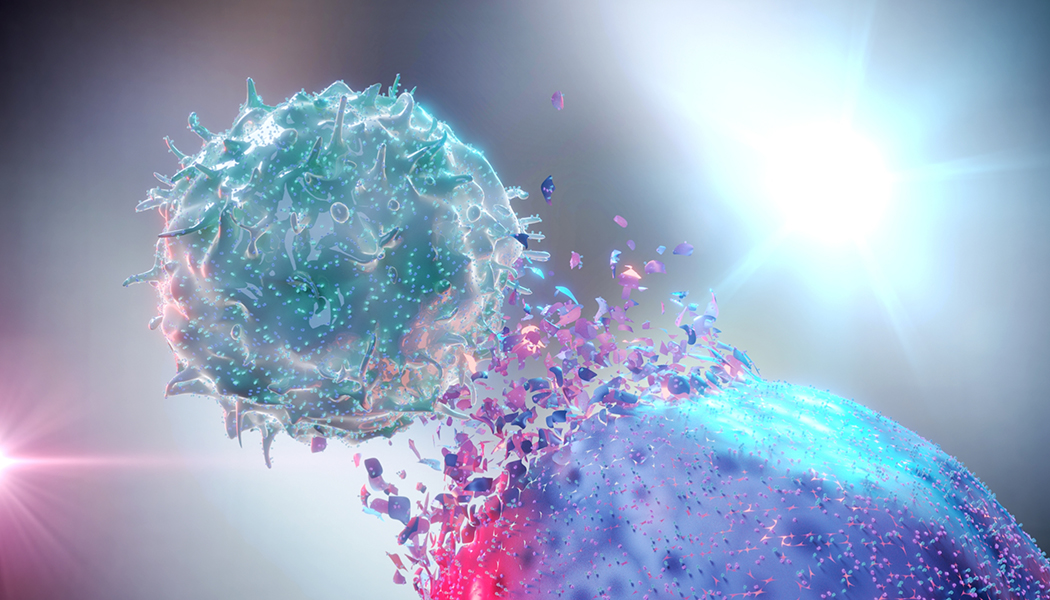Natural Killer (NK) Cell-based Treatment Demonstrates Its Potential to Become an Effective Novel Cancer Therapy
Natural Killer (NK) cells are specialized lymphocytes that play critical roles in the immune response against abnormal cells, including all kinds of cancer cells. Different from T cells that need to be pre-activated by antigen-presenting cells before gaining the killing power, NK cells can quickly respond to a wide variety of cancer cells and kill them “naturally” without any prior antigen-presenting activation. Furthermore, NK cells can secrete several special molecules or immune-enhancing cytokines that act on other types of immune cells, such as macrophages, to strengthen the attack on cancer cells. Therefore, NK cell-based treatment approaches are gaining increased attention in the field of cancer immunotherapy.
Recently, impressive data from a phase I clinical trial of NK cell-based therapy was presented at the virtual Annual Meeting of the American Association for Cancer Research (AACR) by a research team from The University of Texas MD Anderson Cancer Center. Cord blood-derived natural killer (cbNK) cells were used in the trial to treat recurrent or refractory CD30-positive lymphomas, and the results showed that the objective response rate is 100% amongst the four patients enrolled, which is very encouraging although the trial is still in its initial stage.
The researchers strengthened the cancer-killing capability of NK cells by arming them with “biological weapons” AFM13 engagers. These AFM13 engagers are bispecific antibodies that are able to specifically and simultaneously bind target molecules CD30 on leukemia/lymphoma cells and NK-activating receptors CD16A on various types of NK cell. The groundbreaking clinical trial on these AFM13 pre-complexed NK-cells demonstrates that the bispecific engager AFM13 has the potential to help NK cells target and destroy cancer cells not only more effectively—but also safely. No major or common side effects, such as cytokine release syndrome, neurotoxicity syndrome, or graft-versus-host disease, were observed during the trial.
Inspired by the positive clinical trial results, the research team, led by Dr. Katayoun Rezvani at the MD Anderson Cancer Center, is planning to further develop the NK cell-based treatment into an effective novel cancer therapy for treating lymphoma, leukemia, and solid tumors in the future.
Additional Reads You May Enjoy:
Lymphoma is Largely Gone After Covid-19 Infection: demonstrating the Power of the Immune System
Catching Cancer Cells on Their Way to Spreading
3 Important Tips For Immuno-Oncology Drug Treatment
If you feel the information is helpful, please sign up for our e-newsletter here and or make your generous gift here so that we can continue to bring such information to you and keep you connected with the cancer research community.
References:
1. Affimed Announces Presentation at AACR Highlighting Initial Data from Phase 1 Study of Cord Blood-derived Natural Killer Cells Pre-complexed with Innate Cell Engager AFM13. Intrado GlobeNewswire, April 9, 2021.
2. Combining AFM13, a bispecific CD30/CD16 antibody, with cytokine-activated cord blood-derived NK cells facilitates CAR-like responses against CD30+ malignancies. Clinical Cancer Research, May 13, 2021;
https://clincancerres.aacrjournals.org/content/early/2021/04/29/1078-0432.CCR-21-0164












